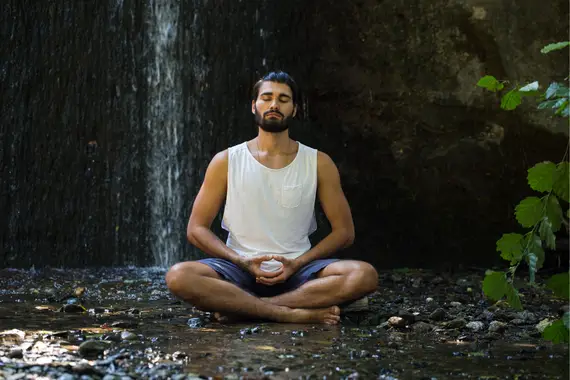What is Meditation? A Comprehensive Guide
Meditation is a practice that involves training the mind to focus and achieve a state of calm and relaxation. It is a technique that has been used for centuries in many cultures around the world. Meditation can be used for a variety of purposes, including stress reduction, improved focus and concentration, increased self-awareness, and spiritual growth. If you’re interested in trying meditation but don’t know where to start, this guide is for you.
Meditation: History
The origins of meditation can be traced back to ancient India, where it was used as a spiritual practice. Over time, meditation spread to other parts of the world, including China, Japan, and Southeast Asia. Today, meditation is practiced all over the world by people from all walks of life.
Meditation: Types
There are many different types of meditation, each with its own unique approach and benefits. To name a few:
Mindfulness meditation
Transcendental meditation
Loving-kindness meditation
Yoga meditation
Chakra meditation
Zen meditation
The Science Behind Meditation
Over the years, there has been a growing body of scientific research on the benefits of meditation. Studies have shown that meditation can help reduce stress, anxiety, and depression, improve focus and concentration, and even lower blood pressure and improve overall physical health.
Meditation: A Step-by-Step Guide
Meditation is a simple practice that can be done almost anywhere, at any time. Here’s a step-by-step guide on how to meditate:
Find a quiet and comfortable place to sit or lie down.
Close your eyes and take a few deep breaths.
Focus your attention on your breath, noticing the sensation of the air moving in and out of your body.
If your mind wanders, gently bring your attention back to your breath.
Continue to focus on your breath for as long as you like, whether it’s a few minutes or a longer session.
Meditation Benefits
Meditation has numerous benefits for both physical and mental health, as well as spiritual growth. Some of the benefits are:
Physical Health Benefits:
Lowered blood pressure
Reduced symptoms of irritable bowel syndrome (IBS)
Reduced symptoms of insomnia
Improved immune function
Reduced symptoms of chronic pain
Mental Health Benefits:
Reduced symptoms of anxiety and depression
Improved mood and emotional regulation
Increased self-awareness and self-acceptance
Improved focus and concentration
Reduced stress and anxiety in caregivers
Spiritual Growth Benefits:
Increased Self-Awareness
Connection to a Higher Power
Inner Peace and Calm
Improved Intuition
Greater Compassion and Empathy
Meditation and Personal Development
In addition to the physical, mental, and spiritual benefits, meditation can also be a tool for personal development. By practicing meditation regularly, you can develop a greater sense of self-awareness, improve your ability to focus and concentrate, and cultivate a sense of inner peace and calm.
Meditation: Common Misconceptions
There are many misconceptions about meditation that can prevent people from trying it out. Here are some common myths:
Meditation is only for spiritual or religious people.
You have to sit cross-legged for hours to meditate.
Meditation is about stopping your thoughts completely.
Meditation is only for people who are “good” at it.
In reality, meditation is a simple and accessible practice that can be done by anyone, regardless of their background or experience level.
Tips for a Successful Meditation Practice
Here are some tips to help you get the most out of your meditation practice:
Start small: Begin with just a few minutes of meditation each day and gradually work your way up to longer sessions.
Find a comfortable position: You don’t have to sit cross-legged if it’s uncomfortable for you. Experiment with different positions until you find one that works for you.
Eliminate distractions:Turn off your phone and find a quiet space where you can meditate without interruptions.
Be patient: Meditation is a skill that takes time and practice to develop. Don’t get discouraged if your mind wanders or you don’t experience immediate benefits.
Use guided meditations: If you’re new to meditation, using guided meditations can be helpful in providing structure and guidance.
Incorporate mindfulness into your daily life:</strong>Mindfulness can be practiced throughout the day by paying attention to your thoughts, feelings, and surroundings.
Frequently Asked Questions
Q: Can meditation be harmful?
A: While meditation is generally safe for most people, it’s important to talk to your doctor if you have any underlying medical conditions or concerns.
Q: How often should I meditate?
A: It’s up to you how often you want to meditate, but most experts recommend at least 10-20 minutes a day.
Q: What if I can’t stop my thoughts during meditation?
A: It’s normal for your mind to wander during meditation. Instead of trying to stop your thoughts, try to simply observe them without judgment and bring your focus back to your breath.
Q: Can meditation replace medication for mental health conditions?
A: While meditation can be helpful for managing symptoms of mental health conditions, it should never replace medication without the guidance of a healthcare professional.
Q: How long does it take to see results from meditation?
A: The benefits of meditation can vary from person to person, but many people report feeling more relaxed and focused after just a few weeks of regular practice.
Conclusion
In conclusion, meditation is a simple yet powerful practice that can have a variety of physical, mental, and spiritual benefits. By incorporating regular meditation into your daily routine and following these tips, you can develop a greater sense of self-awareness, inner peace, and connection to the world around you. Remember to start small, be consistent, and eliminate distractions to get the most out of your meditation practice. Don’t let common misconceptions about meditation hold you back from experiencing its many benefits.

